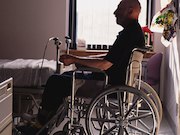More than a third of older nursing home residents did not start medication after myocardial infarction
WEDNESDAY, Oct. 25, 2017 (HealthDay News) — Thirty-seven percent of older nursing home (NH) residents do not initiate secondary prevention medications after acute myocardial infarction (AMI), according to a study published online Oct. 17 in the Journal of the American Geriatrics Society.
Andrew R. Zullo, Pharm.D., Ph.D., from Brown University in Providence, Rhode Island, and colleagues performed a retrospective cohort study to assess new use of secondary prevention medications after AMI in NH residents who were previously nonusers. Data were included for 11,192 NH residents aged 65 years and older who were hospitalized for an AMI between May 2007 and March 2010.
The researchers found that 37, 41, and 22 percent of residents had no, one, and two secondary prevention medications initiated after AMI. After adjustment for covariates, fewer secondary prevention medications were used in older residents; women; and those with a do-not-resuscitate order, functional impairment, and cognitive impairment (proportional odds ratios, 0.48, 0.88, 0.9, 0.77, and 0.79, respectively).
“More than one-third of older NH residents in the United States do not have any secondary prevention medications initiated after AMI,” the authors write. “A lack of evidence about the safety and effectiveness of secondary prevention medications in the NH population and unmeasured person-centered goals of care are plausible explanations for these findings.”
One author disclosed ties to UnitedHealth Group; a second disclosed ties to iodine.com; HCR ManorCare Inc. provided data used in the study.
Copyright © 2017 HealthDay. All rights reserved.








